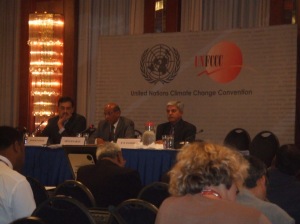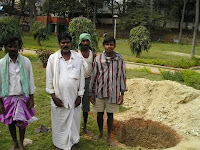/sub-categories/news-and-articles
News and Articles
Direct rice seeding CSR initiative of Pepsico
Posted on 07 Jul, 2009 02:09 AM  Pepsico, the manufacturer of Pepsi and several other beverage a
Pepsico, the manufacturer of Pepsi and several other beverage a
Groundwater/energy nexus: A discussion paper with request for comments
Posted on 06 Jul, 2009 08:58 AMView discussion paper: energy-water-action-study-discussion-paper-june-2009 Dear Sir / Madam, Ground water pumping using electricity is a complex issue, leaving all actors - the farmers, distribution company, State government and environment conscious analysts - frustrated and dissati
The “Bonn” of contention
Posted on 06 Jul, 2009 06:54 AMAs the Bonn climate talks have come to a close we would like to bid farewell to frequent long blog posts and continue to facilitate a knowledge dialogue with our negotiators and key officials who have a direct stake in the process to forming our Bonn of contention for 10-14th August when all climate leaders would be meeting again. [caption id="" align="alignleft" width="300" caption="Dr.Shyam Saran at the press conference"] [/caption] For India, since only a very limited population has its outreach in the internet world, we plan to get the word out through vernacular media into different and remote regions of India. Considering India has around 20 official languages and over 100 different dialects, we pay respect to our rich diversity by approaching outreach through radio and local language newspapers along with blogging. On 12th of June, Mr Shyam Saran was extremely unhappy with the pace at which the negotiations were proceeding, as he said so in the press conference he held at the UNFCCC negotiations. Through the various meetings at Bonn and some post Bonn meetings with some high level officials involved associated with the delegations, the following main points came through:
[/caption] For India, since only a very limited population has its outreach in the internet world, we plan to get the word out through vernacular media into different and remote regions of India. Considering India has around 20 official languages and over 100 different dialects, we pay respect to our rich diversity by approaching outreach through radio and local language newspapers along with blogging. On 12th of June, Mr Shyam Saran was extremely unhappy with the pace at which the negotiations were proceeding, as he said so in the press conference he held at the UNFCCC negotiations. Through the various meetings at Bonn and some post Bonn meetings with some high level officials involved associated with the delegations, the following main points came through:
A moment for "He who fixes your pipe and She who cleans your home"
Posted on 22 Jun, 2009 11:41 AMImage and Content Courtesy: Avinash Krishnamurthy, BIOME Environmental Solutions Pvt. Ltd.,
Meet Muniyappa and his team of well diggers. They have dug over a 150 wells with us in the last two years and perhaps more than a 1000 wells in their life time. While digging Muniswamy (or someone else in the team) is drenched in sweat and is bare chested. He climbs up and down the well which can be upto 40 ft deep on footholds 2 inches deep that he himself digs into the sidewalls of the wells.  When he is deep down under, digging, and soil has to be hauled up, Srinivasu and Muniyappa are precariously perched on the side of the well pulling up the rope that holds the basket full of soil. And then once the well is dug, concrete rings (each weighing in the range of 75 Kg to 250 Kgs depending on the size of the well) are introduced down from the top with the help of the rope - and the sinews of Muniyappa, Srinivasu or Muniswamy. And during this process, Muniswamy virtually climbs in and out of the well for each ring that is introduced.
When he is deep down under, digging, and soil has to be hauled up, Srinivasu and Muniyappa are precariously perched on the side of the well pulling up the rope that holds the basket full of soil. And then once the well is dug, concrete rings (each weighing in the range of 75 Kg to 250 Kgs depending on the size of the well) are introduced down from the top with the help of the rope - and the sinews of Muniyappa, Srinivasu or Muniswamy. And during this process, Muniswamy virtually climbs in and out of the well for each ring that is introduced.
SANDRP : Press Release - Conflict of interest
Posted on 22 Jun, 2009 11:26 AMmmForwarded to the Portal by: Himanshu Thakkar, SANDRP 
PROJECT PROMOTER IS CHAIRING ENVIRONMENT CLEARANCE COMMITTEE LETTER SENT TO ENVIRONMENT MINISTER: TEST FOR UPA'S CLAIMS ON GOVERNANCE
For over two years now, Mr. P Abhraham who is on the Board of several hydropower and dam companies has been chairing the Ministry of Environment and Forests' Expert Appraisal Committee on River Valley and Hydropower projects. The committee, set up under the EIA Notification 2006 and EPA 1986, screens proposals for dams and hydropower projects for clearances at various stages. The committee also takes decisions on several very crucial policies governing the clearances for these projects. There is clear conflict of interest here between Abraham's role as director of companies and as this most crucial regulatory position in the Ministry of Environment and Forests. Over the past two years, there has been at least six occasions when a project of the companies where Abraham is a director has come for clearance before the committee he chairs. This is a completely unacceptable situation and a number of social and environment groups have written to the New Union Environment Minister to remove Abraham from this position, before the next meeting of the committee he chairs happens (it is scheduled for June 15-16, 2009).
Among many other power and dam companies, Abraham is on the Board of Lanco Infratech, GVK Industries Ltd, JSW Energy Ltd, PTC Ltd, Nagarjun Construction and Maharashtra Power Generation Company. Some of the projects from such companies that came up before the EAC that Abraham chairs over the last two years include the 3000 MW Demwe Hydropower project (Arunachal Pradesh), the 76 MW Phata Byung HEP (Uttarakhand), the 76 MW Rambara HEP (Uttarakhand), the 170 MW Bogudiyar-Sirkari Bhyol HEP (Uttarakhand), the 200 MW Mapang Bogudiyar HEP (Uttarakhand) and the 260 MW Kuther HEP (Himachal Pradesh). Abraham has been abstaining from the meetings whenever these projects came up before the EAC, but this is clearly not sufficient.
About the Govt. of India's dugwell recharge programme
Posted on 17 Jun, 2009 09:27 PMCAREWATER's recent solicitation for comments on IWP blog (click here), on their research study on dugwell recharge draws attention to a little-known programme of the government of India on decentralized groundwater recharge through the use of farmer d
Climate change treaty : The deal of our life
Posted on 16 Jun, 2009 12:49 AMDecember this year in Copenhagen the countries of the world are going to sign a treaty that will change our life as we know it. Their commitments today will affect our quality of life tomorrow.
Groundwater in India: Conference on groundwater hosted by ACWADAM
Posted on 12 Jun, 2009 09:20 AMA sharing workshop on groundwater organised by ACWADAM (Advanced Center for Water Development and Management) in Pune on 21/22nd May 2009 saw some very good presentations being made. Dr Tushaar's Shah's keynote speech provided an amazing big picture of groundwater use in agriculture. The presentation can be viewed on slideshare and the entire speech is available on YouTube in 4 parts.
Reports on implementation of national rural employment guarantee act (NREGA)
Posted on 11 Jun, 2009 02:27 PM"Work in progress", is an article by Jean Dreze and Christian Oldiges, that appeared in the Feb. 14-27, 2009 issue of the Frontline Magazine, that compares the data from the NREGA website (www.nrega.nic.in) related to the first two years (2006-07 and 2007-08) of implementation of the NREGA.
